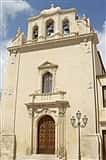Stay
Visit a locality browsing the menu on the left. In each Italy area you can then choose the best touristical structures we are proposing.
Most viewed in
Italy
-
Sunland since 1979 is the leading tour operator for ground hanling services on Amalfi Coast, Cilento and Neapolitan Riviera. Sunland is the partner of some of the biggest tour operator world wide. Our attentive staff is at your service for: Hotel accomodation...
-
The Amalfi Coast, suspended between sea and Sky, is a land of an amazing beauty. Our wish, having the pleasure to be your driver/guide, is to share with you the traditions, art, history, landscapes and the beauty that makes this land, " The Divine Amalfi...
-
Self-catering villas and apartments on the Amalfi Coast with pool, access to the sea and air conditioning. Amalfi Vacation owns and manages all the Amalfi Coast villas shown on the website. We are specialists in luxury villas and self-catering apartments...
-
Located on the famous AmalfiCoast drive, a few minutes from the famous town of Amalfi, the Santa Caterina enjoys a panoramic coastal setting of incomparable beauty. The history of this special resort is as impressive as its surroundings. In 1880, Giuseppe...
-
Situated on the last bend of Amalfi's promenade and beach, this hotel is on four levels. Bright and Mediterranean in style, the Marina Riviera is a converted old noble villa. All rooms are spacious & tastefully furnished, and have open windows or balconies...
Print this page
Send to a friend by e-mail
Church of S. Maria di Gesù
-

Belonging to "Osservanti Minori" friary founded in 1509 by Liege Carlo d'Aragona, was rebuilt in a new site at the beginning of 1700's. The holy building, with its great nave endowed with a crypt, was finished around the middle of the XVIII century. A beautiful portal and a bell tower dominate the frontage. Inside there are cave paintings and roccocò stuccoes. particularly interesting are the two high altar's columns adorned with bas-relisf recemes. Among the paintings, the Immaculate with the Saints Francesco and Rosalia, subsequent to the Counter Reformation, the Crucifixion, San Liborio as well as the Via Crucis stops distinguish themselves by its beauty. At the entrance, on the left, is the polychrome marbles' mausoleum of 1734 of Ascensio Battaglia, a famous commander and relevant person of the new town's rebuilding stage. On the nave's walls there are plaques of other ancient graves. In the apse there are Mario Mogani's works.
(source: Avola, la città esagonale)